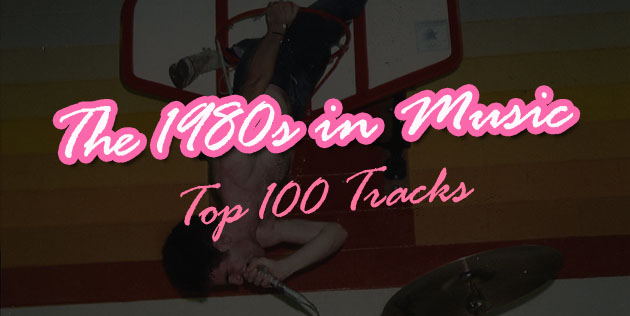
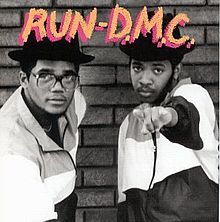
30.
Run-D.M.C.
“It’s Like That”
[Profile / Arista; 1984]
Run-D.M.C.’s hit single “It’s Like That” has been regarded as one of the greatest hip-hop singles of all time. The group used this track to show how their lives were back on the streets of Queens, New York: it was simple “Like That.” Not only did this track work as an eye-opener to the problems going on in Queens, it also was a part of the new school of hip-hop. They were able to create a social revolution in the ‘80s through both their sound and attire. From matching hats, to tracksuits, and gold chains they would have never have the influence over hip-hop and culture that they had without recording this seminal track.
– Humza Ghori
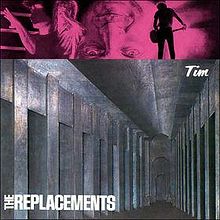
29.
The Replacements
“Bastards of Young”
[Sire; 1985]
The video for “Bastards Of Young” is nearly as iconic as the song: a slowly pulled back shot of a speaker, a turntable, and some records, presumably playing the song and culminating in the listener destroying the speaker. The anger expressed in this action mimics the frustration of the song, where Paul Westerberg sings of being young in the 1980s, a generation without a war to fight in and where the future looks bleak at best. But, at the heart of the song is the disconnect between the Baby Boomers and the Reagan Youth, where Westerburg admits “the ones that love us the least, are the ones we’ll die to please,” portraying the same frustration that is at the heart of The Breakfast Club and Ferris Bueller’s Day Off. Still, Westerberg is not as much of a punk kid as he might seem, wisely knowing “it beats picking cotton and waitin’ to be forgotten.” Oh yeah, and the guitar riff kicks ass, too.
– Philip Cosores

28.
New Order
“True Faith”
[Factory; 1987]
It’s strange that a song so overtly about drug taking could be such a huge hit. The fact that it reached number four on the British charts and was New Order’s first to chart in the USA despite its subject matter, which treads some dark paths, says a lot about the catchiness. It revolves around Bernard Sumner’s metaphor of drug-taking as something that you become dedicated to, like religion, hence the song’s title. Thought the truth is, people probably didn’t realise and just latched on to the lines they could relate to: about feeling extraordinary, about feeling free, about finally reaching something they’ve been anticipating for a long time.
See, not only is the song about drug taking, but it’s a perfect soundtrack for drug taking. The song is written about smack, but would have been appreciated by those on ecstasy. A song like “True Faith” with its flat beat, interplaying keyboards, punchy synth bass and fist-pumping chorus is a hit on any nightclub filled with fuelled-up all nighters. “True Faith” makes for fascinating listening on both physical and mental levels, intoxicated or sober, and that is why it is still a staple today.
– Rob Hakimian
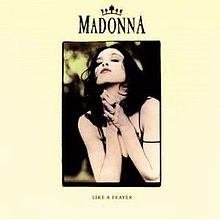
27.
Madonna
“Like A Prayer”
[Sire / Warner Bros.; 1989]
Over twenty years later, Madonna’s “Like a Prayer” remains one of the more simultaneously honest, provocative, and satisfying pieces of music that the artist ever recorded. Despite the fact that its video is among the most ire-raising ever, “Like a Prayer” endures because it transcends its own seeming desire to antagonize. Famously constructed in the gospel model, but unflinchingly a pop song fueled by sexual exploration, “Like a Prayer” was gift wrapped for controversy almost by default given its delivery model. But, besides that, the song is memorable as a leap forward for Madonna’s music; if not just for the thematic complexity it puts forward, but for the impressive composition that went into the construction of “Like a Prayer.” A slow-building track that effortlessly blends genre signifiers with subversive imagery, the song earns its repeated crescendos, crashing and kicking against one of the better hooks Madonna would ever sing.
– Daniel Rivera
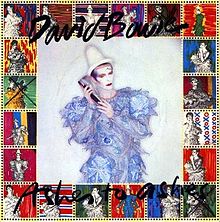
26.
David Bowie
“Ashes to Ashes”
[RCA; 1980]
It takes some guts to pick one single song out of Bowie’s massive catalogue and declare it his very best. Amidst all the contenders, “Ashes to Ashes” seems the safest bet. A direct sequel to his first hit (“Space Oddity”), the song revisits Major Tom and reevaluates him as yet another alias of Bowie; a lone, depressed, drug addicted has-been. Accompanied by distorted keyboards and a unique, visionary music video (that would inspire many an artist), Bowie managed to create the ultimate musical puzzle: an avant-garde self-portrait hidden inside revisionist pop.
– John Wohlmacher
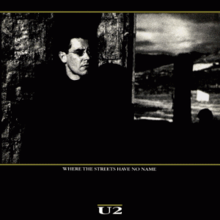
25.
U2
“Where Streets Have No Name”
[Island; 1987]
There’s nothing like a great introductory track to a great album. And the legendary opening of U2’s The Joshua Tree may as well be the quintessential example. Here’s an album-opener that relies on set-up and release more than anything – starting off with the faintest sound of a church organ before each of the band’s instruments are introduced – that nevertheless stands as a perfectly great rock-song by itself. So I have to ask : has there ever been a more epic and uplifting album-opener in the history of music? While “Where the Streets have No Name” doesn’t innovate like “Zoo Station” or “Even Better Than the Real Thing,” its rousing fervor continues to wow listeners today. You might go as far as to say that the song represents what U2’s all about: the Edge’s epic guitar lines, the band’s usage of expansive reverb, Bono’s soaring vocals and social-conscious lyrics, etc. But its the uniformity of these se elements combined, and how the song reaches this uniformity that ultimately makes “Where the Streets Have No Name” a brilliant and timeless track.
– Ryan Studer
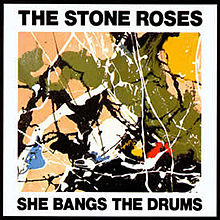
24.
The Stone Roses
“She Bangs The Drums”
[Silvertone; 1989]
From the landmark self-titled album from The Stone Roses, “She Bangs The Drums” has the honor of being the band’s first ever top 40 hit. Sure, the song may not have the haunting quality of “I Want To Be Adored” or the lyrical crescendo of “I Am The Resurrection,” but “She Bangs The Drums” manages to maintain the edge that keeps The Stone Roses’ pop anthems in check while providing an up-tempo, firing-on-all-cylinders firecracker of a melody. And from the moment when the bridge launches back into the sing-along chorus, there is no doubt that you are hearing four band members connecting in the studio, something that was unfortunately short-lived for the band.
– Philip Cosores
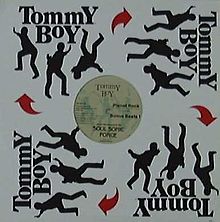
23.
Afrika Bambaataa & Soulsonic Force
“Planet Rock”
[Tommy Boy/Warner Bros.; 1982]
This entire list and series exists to champion influential and important pieces of musical history, and while many of those borrow from similar ideas or genres, building slowly towards modern music, few singles were as experimental and ambitious as “Planet Rock.” Produced by the acclaimed Arthur Baker, “Planet Rock” was as much an early techno track as it was a brass hip hop single, a blend of Kraftwerk’s aesthetics and freestyle rhymes. I distinctly remember hearing “Planet Rock” for the first time and being completely overwhelmed with the paradigm shift in the opening twenty seconds. Bambaataa’s opening monologue, interlaced with canned cheers and laughter, a common trope for 80s hip hop, is immediately flipped on its head, as the filtered cheers drop out and precise synthesizer and vocoder lines are layered behind the revolving singers. There are few moments in music so brilliant and daring, taking cues from Kraftwerk and Gary Numan on a hip hop track, that it not only works perfectly, but it continues to influence musicians to this day.
– Erik Burg
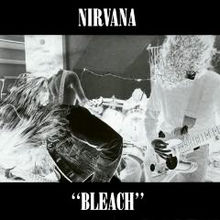
22.
Nirvana
“About A Girl”
[Sub Pop; 1989]
On its surface it seems that this song – one of Nirvana’s best and catchiest – is simply “About A Girl,” which is possible, after all it was written for Kurt Cobain’s then-girlfriend and after binge listening to Meet The Beatles!. But parsing over the lyrics reveals something deeper at play; a strained relationship in which Cobain wants to break free and is tired of being hung out to dry. Cobain’s dry delivery betrays the tiredness and lack of passion that he’s getting out of the relationship.
Quite shockingly, Cobain didn’t want to release this song on Bleach since it was too poppy, something that he was quickly talked out of. He must have come around to the song rather quickly since it remained a live staple for the remainder of the band’s existence, and found a whole new life in the acoustic form on the posthumously released Unplugged In New York.
– Rob Hakimian
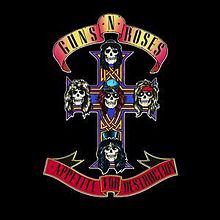
21.
Guns N’ Roses
“Rocket Queen”
[Geffen; 1987]
For some reason, nobody does the two-songs-in-one trick anymore that bands used to do all the time. “Rocket Queen,” the closing track on the Gunners’ classic debut Appetite for Destruction, is one of the last high-profile instances of this phenomenon, and also one of the best. The first half of this song is a fine enough disco-metal romp, but what sets it apart as Axl Rose’s crowning achievement is the final two and a half minutes, which perfectly captures the complexities of the polarizing frontman. It’s not just that Rose penned one of his sweetest, most tender melodies ever, it’s that he stuck it onto the end of one of his band’s most ferocious guitar workouts. Everything we love and hate about Rose and GNR is all here.
– Sean Highkin

